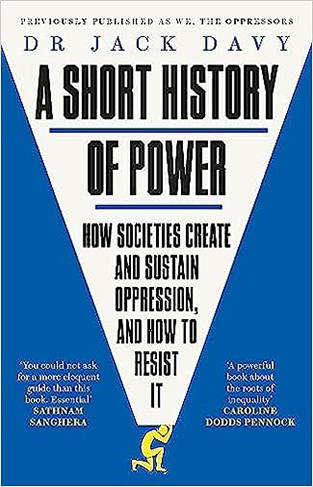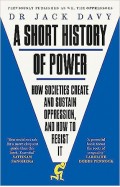A Short History of Power: How societies create and sustain oppression, and how to resist it
By: Jack Davy
-
Rs 2,965.50
- Rs 3,295.00
- 10%
You save Rs 329.50.
Due to constant currency fluctuation, prices are subject to change with or without notice.
'I thought I had a pretty good sense of how colonialism shapes modern society, but Dr Davy has shown me that understanding these things is a lifetime's work. In the absence of time to read everything, you could not ask for a more eloquent guide than this book. Essential' - Sathnam Sanghera
An eye-opening book about how societies are designed to support the status of those in power at the destructive expense of those without it. Read it and take responsibility.
ECOLOGICAL OPPRESSION
In 1958, China declared war on sparrows, destroying its own crops and contributing to the deaths of more than 10 million people.
ECONOMIC OPPRESSION
In the nineteenth century, the Shuar people of Ecuador were driven by economic necessity to procure shrunken heads for the Western curio market. The bloody wars that ensued nearly destroyed their society.
EDUCATIONAL OPPRESSION
There have been fifty-five prime ministers of Great Britain, of whom forty-eight have been privately educated, creating a society built by and for the privileged.
These are just some of the stories in this remarkable book that illustrate the key factors that allow societies to create and sustain oppressive systems. Some are historical. Others have played out right before our eyes over the last decade. All are rooted in the systems in which we all participate.
'I thought I had a pretty good sense of how colonialism shapes modern society, but Dr Davy has shown me that understanding these things is a lifetime's work. In the absence of time to read everything, you could not ask for a more eloquent guide than this book. Essential' - Sathnam Sanghera
An eye-opening book about how societies are designed to support the status of those in power at the destructive expense of those without it. Read it and take responsibility.
ECOLOGICAL OPPRESSION
In 1958, China declared war on sparrows, destroying its own crops and contributing to the deaths of more than 10 million people.
ECONOMIC OPPRESSION
In the nineteenth century, the Shuar people of Ecuador were driven by economic necessity to procure shrunken heads for the Western curio market. The bloody wars that ensued nearly destroyed their society.
EDUCATIONAL OPPRESSION
There have been fifty-five prime ministers of Great Britain, of whom forty-eight have been privately educated, creating a society built by and for the privileged.
These are just some of the stories in this remarkable book that illustrate the key factors that allow societies to create and sustain oppressive systems. Some are historical. Others have played out right before our eyes over the last decade. All are rooted in the systems in which we all participate.
A Short History of Power: How societies create and sustain oppression, and how to resist it
By: Jack Davy
Rs 2,965.50 Rs 3,295.00 Ex Tax :Rs 2,965.50
Zubin Mehta: A Musical Journey (An Authorized Biography)
By: VOID - Bakhtiar K. Dadabhoy
Rs 892.50 Rs 1,050.00 Ex Tax :Rs 892.50
Disney Frozen 2: Touch and Feel Forest
By: Editors of Studio Fun International
Rs 1,015.75 Rs 1,195.00 Ex Tax :Rs 1,015.75
The Origins of Political Order From Prehuman Times to the French RevolutioN
By: Francis Fukuyama
Rs 4,045.50 Rs 4,495.00 Ex Tax :Rs 4,045.50
Manning Up: How the Rise of Women Has Turned Men into Boys
By: Kay Hymowitz
Rs 845.75 Rs 995.00 Ex Tax :Rs 845.75
The Obama Syndrome: Surrender At Home War Abroad
By: Tariq Ali
Rs 1,100.75 Rs 1,295.00 Ex Tax :Rs 1,100.75
The Quest For Meaning: Developing A Philosophy Of Pluralism
By: Tariq Ramadan
Rs 1,185.75 Rs 1,395.00 Ex Tax :Rs 1,185.75
The Pakistan US Conundrum Jihadists The Military And The People The Struggle For Control
By: Yunas Samad
Rs 1,185.75 Rs 1,395.00 Ex Tax :Rs 1,185.75
An Enemy We Created: The Myth Of The Taliban Al Qaeda Merger In Afghanistan 19702010
By: Alex Strick van Linschoten
Rs 4,197.50 Rs 8,395.00 Ex Tax :Rs 4,197.50
WikiLeaks: Inside Julian Assanges War on Secrecy
By: David Leigh & Luke Harding
Rs 637.50 Rs 850.00 Ex Tax :Rs 637.50
Disney Frozen 2: Touch and Feel Forest
By: Editors of Studio Fun International
Rs 1,015.75 Rs 1,195.00 Ex Tax :Rs 1,015.75
No recently viewed books available at the moment.
Zubin Mehta: A Musical Journey (An Authorized Biography)
By: VOID - Bakhtiar K. Dadabhoy
Rs 892.50 Rs 1,050.00 Ex Tax :Rs 892.50
A Short History of Power: How societies create and sustain oppression, and how to resist it
By: Jack Davy
Rs 2,965.50 Rs 3,295.00 Ex Tax :Rs 2,965.50
Disney Frozen 2: Touch and Feel Forest
By: Editors of Studio Fun International
Rs 1,015.75 Rs 1,195.00 Ex Tax :Rs 1,015.75














-120x187.jpg?q6)








-120x187.jpg?q6)



-120x187.jpg?q6)



